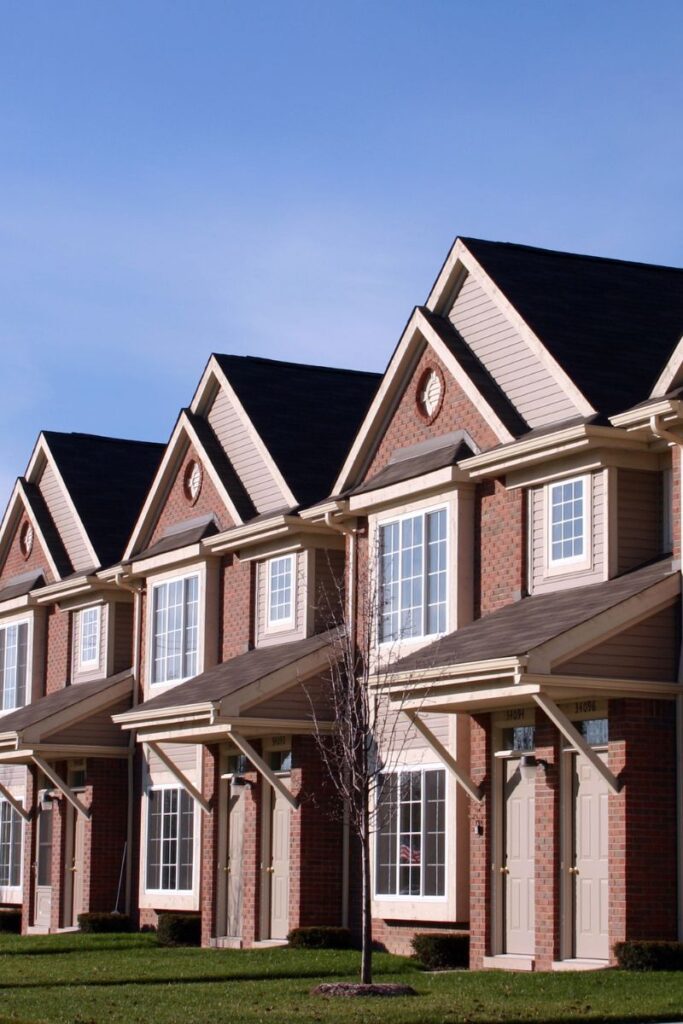For some buyers, a condo is a compromise. Detached homes may feel out of reach, and a condo becomes the most affordable way to step into ownership. For others, it’s a lifestyle choice. A condo may mean no mowing lawns, no shovelling snow, and no worrying about replacing the roof, since the condo corporation often takes care of those responsibilities.
But “may” is the key word. In some condo townhomes, owners are still responsible for certain exterior tasks like maintaining decks, windows, or landscaping. That’s why it’s important to review the status certificate carefully and be crystal clear on what to expect. Your lawyer will review it in detail, but you should read it yourself as well. You know best what lifestyle you are after, and your realtor should also go through it with you to make sure it lines up with your expectations.
The Different Types of Condos in Ontario
Not all condos are alike. Here are the main types you’ll come across:
✅ Standard (apartment or townhouse) condominium
🏠What you own: The interior of your unit.
💰What the fees cover: Building operations, insurance for common areas, and contributions to the reserve fund.
⚠️What to watch out for: Rules on pets, rentals, and renovations vary by building.
✅ Vacant Land Condominium (VLC)
🏠 What you own: A parcel of land that is legally the “unit.” The home is built and maintained by you.
💰 What the fees cover: Shared infrastructure such as private roads, sewers, lighting, or greenspace.
⚠️ What to watch out for: The condo corporation may still control exterior paint colours, fencing, gardening, or holiday décor.
✅ Common Elements Condominium with POTL (Parcel of Tied Land)
🏠 What you own: Your freehold property, plus a legally “tied” interest in a common elements condo.
💰 What the fees cover: Upkeep of features such as roads, visitor parking, or a clubhouse.
⚠️ What to watch out for: You carry full freehold responsibilities, but condo rules may still govern how you maintain your driveway, yard, or exterior. Membership in the condo corporation is mandatory and cannot be separated from the property.
💡 Lifestyle Rules Matter
If gardening, exterior decorating, or personal touches are important to you, check the bylaws. Some corporations are flexible, while others are restrictive. Most require written approval for large renovations, and failing to comply can cause problems when you resell.
Understanding Condo Fees and Reserve Funds
Condo fees are one of the biggest differences from freehold ownership. They cover building insurance, maintenance, utilities (sometimes), and contributions to the reserve fund, which is the building’s savings account for major repairs.
⚠️ Watch Out: A low fee may look appealing, but it can signal trouble if the reserve fund is underfunded. That’s when owners face special assessments, one-time payments on top of monthly fees.
If more is included, more should be collected. A building that covers utilities, concierge, pool, and gym should have higher monthly fees and a larger reserve fund than one with minimal services. If the fees look too low for the services offered, that’s a red flag.
Your lawyer will review the financials as part of the status certificate. They’ll confirm that audits are up to date, that the auditor’s report is clean, and that the corporation is complying with Ontario’s condo laws. They’ll also check that reserve fund studies are being done on schedule, which must happen at least once every three years. Keep in mind that while your lawyer ensures legal compliance, they won’t guarantee the financial strength of the corporation. That’s something you as the buyer must assess with your realtor’s guidance.
Who Makes the Rules?
Every condo corporation has a board of directors elected by the owners. The board sets budgets, approves repairs, enforces rules, and makes decisions about how the property is managed. This means that even though you own your unit, you’re also part of a larger community where decisions are made collectively. The health of the board, its level of transparency, and how it communicates with owners can directly impact your experience.
Status Certificate vs. Title Search
These two legal steps happen at very different points in the buying process:
📑 Status Certificate Review
- When it happens: While your offer is conditional
- What your lawyer does: Checks financial health, rules, and legal standing
- Why it matters: If serious problems are found, you can walk away with no penalty
- Typical use: Always included as a condition of sale
📜 Title Search
- When it happens: After conditions are waived but before closing, usually one to two weeks out
- What your lawyer does: Confirms the seller has clear ownership and can transfer the unit
- Why it matters: If the seller is overleveraged or unable to clear debts, they may be in breach and legal action could follow
👉 Key point: The status certificate review protects you before the deal is firm. The title search protects you later, ensuring you actually receive clear ownership.
⏱️The Buying Timeline
Buying a condo doesn’t happen overnight. There are a few key steps along the way, and knowing what comes next can help you feel prepared instead of stressed.
Pre-approval
Meet with a mortgage broker or lender to set your budget.
House-hunting
Visit units, check fees, and assess upkeep.
Offer
Include conditions for financing, inspection, and status certificate review.
Status Certificate Review
Your lawyer reviews the building’s financial and legal standing while the deal is conditional.
Conditions Waived
Once financing, inspection, and status are clear, the deal becomes binding.
Title Search
Your lawyer checks ownership before closing to confirm the seller can transfer clear title.
Closing Day
Funds are transferred, ownership is registered, and you receive your keys.
❓Smart Questions to Ask
When you’re buying a condo, the right questions can give you a clear picture of how the building is managed and whether it really fits your lifestyle. Don’t be shy about asking details. The answers can save you headaches later and help you feel confident about your decision.
- What is included in the monthly fee?
- How much is in the reserve fund?
- Are any special assessments planned?
- Is the corporation in litigation?
- What are the rules for pets, rentals, or renovations?
- Who is responsible for exterior maintenance?
- What approvals are needed for renovations or modifications?
- What recent capital projects have been done, such as parking, garages, roofs, pools, or elevators?
- How were those projects paid for? Was borrowing required, or were owners charged special assessments?
📌 Pro Tips:
Your lawyer is there to protect you, but don’t rely only on them. Take the time to read the status certificate yourself. Things like pet rules, rental restrictions, or extra obligations could be deal breakers for you, even if the building’s finances look solid. It’s also a good idea to have your realtor review it. A second set of trained eyes can spot details you might miss and help you decide if the condo truly fits your lifestyle.
Take time to download the Condo Authority of Ontario’s Condo Buyers’ Guide for an in-depth look at your rights and responsibilities. It’s a free resource that every condo buyer should read.
Real Buyer Stories: When Things Go Right (and When They Do Not)
A smooth purchase (Burlington)
We worked with a buyer who recently purchased a condo apartment in Burlington. The status certificate came back clean: no lawsuits, a healthy reserve fund, and clear rules. Later, the title search confirmed the seller had clear ownership and no debts tied to the property. Closing day was seamless.
We had anticipated that things would go well. Similar units had recently sold in the same building or complex, but not so many that it looked like owners were rushing to leave. Those sales moved quickly, suggesting the market had confidence. Since every buyer’s lawyer would have reviewed a status certificate, it added reassurance.
💡 Pro Tip: Watch the Market Around You
A few recent sales at healthy prices can be a good sign. Too many listings at once can mean trouble.
A deal breaker (Niagara Falls)
Another client nearly purchased a six-year-old condo in Niagara Falls that looked brand new and well cared for. Tarion warranty coverage was still in effect, but the corporation was in litigation with the builder over major leaks in the underground parking. The builder was fighting responsibility under Tarion. The buyer walked away while their offer was still conditional, which was the right decision.
The Toronto subway story
Another buyer in Toronto came across a condo near a subway station that they liked and may have considered. The status certificate revealed two issues: the building shook with every passing train, and there was litigation underway related to the problem. They moved on and kept looking.
💡 Pro Tip: Litigation Impacts Resale
Litigation, whether over leaks, construction flaws, or noise, will hurt resale value. Even if you think you could live with it, the next buyer may not. We always remind clients: never buy something you could not confidently sell if you needed to.
🏁 The Takeaway
When you buy a condo, you’re choosing a home – but you’re also stepping into a community that’s managed and maintained together. That means looking beyond your unit to the financial health of the building and the rules that shape daily life there.
It might sound like a lot, but those extra checks are meant to protect you. When you ask the right questions and lean on your realtor and lawyer for guidance, you’ll be in a good position to pick a condo that works for your budget, fits your lifestyle, and feels like home.





